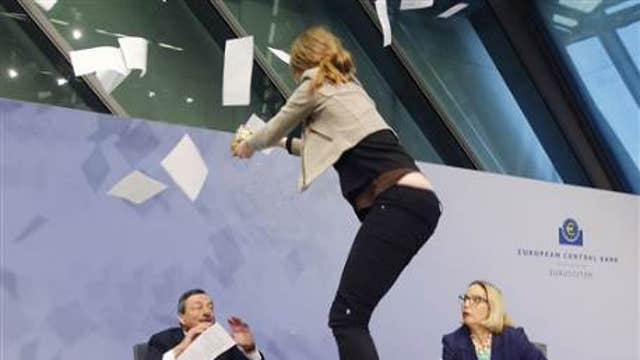ECB Leaves Rates Unchanged, Protestor Charges Draghi
The European Central Bank left interest rates unchanged Wednesday, amid early signs that the central bank's recent massive bond-buying program launched last month is helping underpin growth in the 19-country currency bloc.
The policy-setting Governing Council decided to keep the ECB's main lending rate at a record low 0.05%, where it has stood since last September. The rate the ECB sets on overnight deposits also remained at minus 0.20%, meaning that commercial banks continue to pay to leave excess reserves with the central bank.
The decisions were widely expected by economists.
Mr. Draghi is due to conduct his usual post-meeting press conference at 1230 GMT.
Wednesday's rate decision came amid signs that the eurozone is turning the corner after years of recession and stagnation. Recent data from information services firm Markit showed that the eurozone economy grew at its fastest pace in nearly one year in March. The bloc's largest economy, Germany, is expected to have posted strong growth in the first quarter, based on consumption and trade figures.
A mix of favorable factors is improving the European growth outlook. While a weak euro is giving a boost to exporters by making their products cheaper in global markets, low oil prices are raising the purchasing power of the region's consumers and businesses.
Moreover, the ECB is due to pump over 1 trillion euros ($1.1 trillion) through September 2016 into the eurozone economy via bond purchases in an effort to get inflation back to the ECB's medium-term target of just below 2%. The ECB reached its EUR60 billion monthly target for purchases in the first month of the program, even though it only began buying government bonds on March 9.
Consumer prices in the eurozone fell 0.1% annually in March, the fourth-straight month below zero. Though inflation is expected to be flat this year, ECB forecasters expect it to jump back up to 1.5% next year and 1.8% in 2017.
ECB President Mario Draghi said last month in Brussels that the central bank would take a "holistic" approach to inflation. "It will evaluate the likelihood for inflation not only to converge to levels that are closer to 2%, but also to stabilize around those levels with sufficient confidence thereafter," he said.
The comments appeared aimed at deflecting market concerns that the ECB could pull the plug early on its bond buying program at the first hint of inflation reaching nearer to 2%. These concerns were intensified by comments last week by ECB executive board member Yves Mersch.
If inflation looks like it will exceed the expected 1.8% rate in 2017, "it would of course be appropriate to consider whether we need to adjust our plan," Mr. Mersch said in a German newspaper interview, although he also suggested the program could be bigger if inflation stays stubbornly low.
Mr. Draghi may also be pressed for more perspective on the central bank's optimistic growth outlook. Last month, the ECB's staff raised its forecasts, which now predict that the eurozone will grow over 2% in 2017.
Yet the recent publication of the minutes of the ECB's March meeting suggest that there are some doubts within the Governing Council about whether growth will actually reach that pace.
"It was remarked that the growth outlook for 2017 depended on a number of factors that might become less growth-supportive" toward the end of the projected period, said the accounts.




















